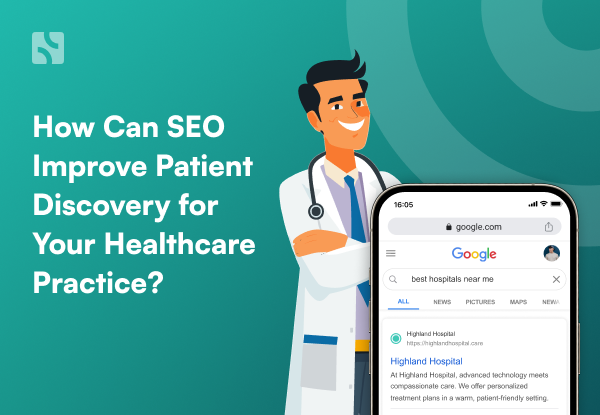Why Medical Websites Are Losing Search Rankings & What Can Be Done

One of the most important factors in digital marketing is keeping a good presence online, especially for medical practices. There is a lot of medical information on the internet, no wonder everyone fights for the top of the search results. Yet ironically, medical websites across the board have found themselves facing an interesting predicament—a steady weakening of their position on search engines that has translated to ongoing attrition of traffic and a significantly weakened presence online.
It is due to a perfect storm caused by a series of events — algorithm updates, content saturation, and search engines wanting to provide the most relevant and authoritative information to users. All of these things must be delved into and acted on in your search for better SEO and to take back your rightful place in the digital realm.
Changing Faces of Medical SEO

With health and wellness medical web design in general, search engine algorithms are improved regularly so that the searchers can find content that is not only accurate but also credible. This ongoing evolution has caused an increased focus on things like the quality of content, user experience, and website authority.
One of the top reasons why medical websites are dropping in search rankings is due to the rise of low-quality, spammy content imitating medical advice. To this end, search engines have adapted and enforced harsher penalties that penalize websites that focus more on the quantity of content, rather than the quality, and allow those with topics deeply researched or explained well to flourish further.
The Content Conundrum
It is true that in the medical field content is king but proportionally not all content is equal. Although many medical websites understand the power of quality information that is not typically found in other sources, that does not mean their information is not just a re-reading of information available in thousands of other places. Other than that, search engines are good at identifying duplicated or nearby duplicated content to penalize websites as either providing no unique content or value.
Creating truly unique and authoritative content that reflects the specific questions and concerns of their target demographic, as opposed to rehashed versions of their competitors’ content, is paramount for healthcare providers to cut through the digital clutter. It comes from having a deep understanding of what is painful for the audience, doing a lot of research, and going into niche topics not already covered.
Why User Experience Matters
When ranking takes precedence over everything else, it is easy to lose sight of what the true goal should always be: giving the user a great experience. Major search engines, like Google, Bing, and Yahoo, have advanced past merely evaluating medical website design templates for usability, speed, and track record.
Healthcare websites that provide a good user experience with easy navigation, quick load times, and responsive design on all devices are more likely to hold a visitor, which also bodes well for improving search performance. Furthermore, using rich media, such as educational videos or interactive tools, can boost the user experience.
Building Authority and Credibility
Search engines reward those who display authority and credibility in their target niche. In the case of medical websites, that would entail using the knowledge and certifications of the healthcare professionals running the practice
Highlighting the credentials, certifications, and accomplishments of the medical professionals can do wonders in building confidence in the website. Furthermore, engaging in discourse with your peers, being a thought leader in well-known medical periodicals, as well as collaborating with other reputable healthcare organizations
The Road to Recovery
It would, of course, be a long, painful redemption process to regain those search rankings that had been lost… but this work could be done. To take back that digital footprint, medical practices need to come at it from all angles to include content ops, technical SEO, and bringing ongoing value to their intended audience.
Building an Effective Content Plan
More than anything else, an SEO strategy is dependent on the type of content being delivered to users. High-quality, informative content is the crux of the website that enables you to reach specific placements for target keywords. This involves:
In-Depth Keyword Research: Pinpointing the best & most suitable keywords in terms of relevance and traffic for the firm and searcher query.
Pillar Content: Extensive, in-depth articles, serving as comprehensive guides to a specific medical topic or condition.
Position 0 (Featured Snippets): Designing content to have the best chance of ringing in Google’s featured snippets, which have become something of a pot of gold in recent years, driving a huge increase in visibility and click-through rate.
Multimedia: Visual, appealing, and informative multimedia elements such as infographics, videos, and interactive tools to improve user engagement and to internalize the main ideas.
Making Content Shareable: Make sure that content is shareable across different social media platforms so that it can reach more people and maybe secure some important backlinks.
Enhancing Technical SEO
The backbone of a strong SEO strategy is content, but the other factors that drive search engine visibility are inevitably tied to the technical details. First and foremost all healthcare practices should:
Mobile-friendly: The site should be responsive and work well on mobile devices.
If you want Google to understand your medical business, then you need to implement schema markup to show it the bits of information it needs to show information like your practice details, practitioner profiles, and the booking of appointments.
Site architecture optimization: Proper website architecture and internal linking with a logical structure help increase overall website performance and indexing of pages on search engines.
SSL Certificate and Security (HTTPS): Here, the website is migrated and secured with an SSL certificate as search engines like secured websites, especially in medical-related sectors where confidential information is required.
In summary, medical sites are dropping in organic search rankings because of several things: algorithm updates, content saturation, and the need for good, trusted content. Regaining lost rankings, medical sites should prioritize UX, content quality, and technical SEO With the strategies mentioned, medical websites can improve their online presence and increase their chances to attract patients to the clinics Sort by Date.
Build a professional website, and start managing your practice like a pro
Recommended
Experience infinite possibilities beyond basic templates
30+ free, customisable templates, meticulously researched and tailored for an optimal patient experience.








